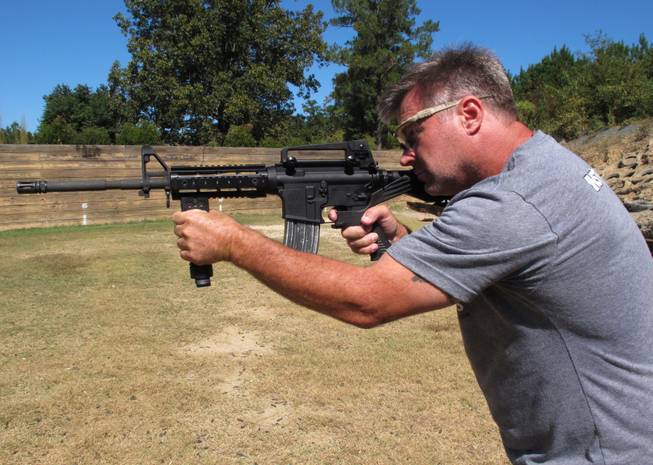
Allen G. Breed / AP
Shooting instructor Frankie McRae aims an AR-15 rifle fitted with a “bump stock” at his 37 PSR Gun Club in Bunnlevel, N.C., on Wednesday, Oct. 4, 2017.
Thursday, Nov. 9, 2017 | 2 a.m.
WASHINGTON — Remember bump stocks?
The previously obscure gun conversion kits, which turn semi-automatic rifles into weapons capable of firing long, deadly bursts, were the bane of the Capitol a month ago, after a gunman used the devices to kill 58 people and wound hundreds of others in Las Vegas. Lawmakers in both parties quickly vowed to ban them. Even the National Rifle Association appeared to endorse restrictions.
But the proposed ban on bump stocks, once hailed as a modest step toward bipartisan compromise on gun safety, may be turning into a cautionary tale of how energetic intentions in the wake of mass shootings can dissipate quickly. As attentions moved elsewhere, the NRA turned against action, and Republican lawmakers decided the devices would be someone else’s problem: the Bureau of Alcohol, Tobacco, Firearms and Explosives, or ATF.
“Right now everyone’s in a holding pattern, because some people around here have hope that ATF will bail us out,” said Rep. Carlos Curbelo, R-Fla., who has co-sponsored a bipartisan measure to ban bump stocks.
And now, with another mass shooting, this one in Texas, capturing the nation’s lamentations, Congress is moving on to yet another gun issue, the failure of the government’s computerized background check system to stop firearms purchases by killers who should have been flagged. On Tuesday, Sens. Jeff Flake, R-Ariz., and Martin Heinrich, D-N.M., said they would introduce legislation to bolster the reporting of domestic violence acts to the background check system.
For opponents of congressional action, the ATF has proved to be a convenient foil. The agency, which regulates firearms, has said it has no jurisdiction over the gun conversion kits because bump stocks are, in fact, not guns. Yet Speaker Paul D. Ryan said he believes “a regulatory fix,” rather than legislation, is the correct way to take bump stocks off the market. That stand has, for now, stalled legislation until Congress hears from bureau officials.
That could happen as soon as next week.
Sen. Charles E. Grassley, R-Iowa, chairman of the Judiciary Committee, announced Monday night that the committee will convene a hearing on bump stocks Tuesday. The witness list has not been made public, but bureau officials are expected to testify.
The desire to ban bump stocks still exists on Capitol Hill, even if it is quieter. Sen. Dianne Feinstein, D-Calif., has proposed legislation banning bump stocks and has more than three dozen co-sponsors, all Democrats.
At least two Republicans, Sens. John Cornyn of Texas, the No. 2 Republican, and Lindsey Graham of South Carolina, said they would be open to banning the devices, depending on what bureau officials say at next week’s hearing.
“If you believe that automatic weapons should be highly regulated and limited, then why would you be against banning a device that makes a gun an automatic weapon?” Graham said.
But Congress will probably have to take action if lawmakers want bump stocks off the market. The ATF has deemed bump stocks “a firearm part” not subject to regulation under federal laws that, since the 1930s, have sharply limited the manufacture and possession of fully automatic weapons.
The NRA was actually the first to put the onus on the ATF. In a statement after the Las Vegas shooting, the powerful gun lobby said the bureau should revisit the bump stock issue, and “immediately review whether these devices comply with federal law.” That was hailed by some as a change for the group, but in fact, the NRA never embraced a ban.
In a recent interview on YouTube with James Yeager, a Tennessee gun enthusiast who runs a firearms training business, the association’s chief lobbyist, Chris Cox, bragged about its head fake.
“The day before we put out that statement there were enough votes in the House of Representatives, the pro-gun Republican House of Representatives, to pass a Feinstein-Curbelo type of bill,” Cox told Yeager. He went on: “The truth is we needed to slow down the process and have an educated conversation.”
To Democrats who support the ban, the bump stocks debate follows a depressingly familiar pattern.
“Every time there’s a gun massacre, we have outrage, grief and silence, and that’s what’s happened here,” said Sen. Richard J. Durbin of Illinois, the No. 2 Democrat. “It happens again and again and again, and this situation is so obvious. It’s a simple fix. And when the National Rifle Association said, ‘We don’t want to see legislation’ — end of story.”
